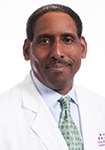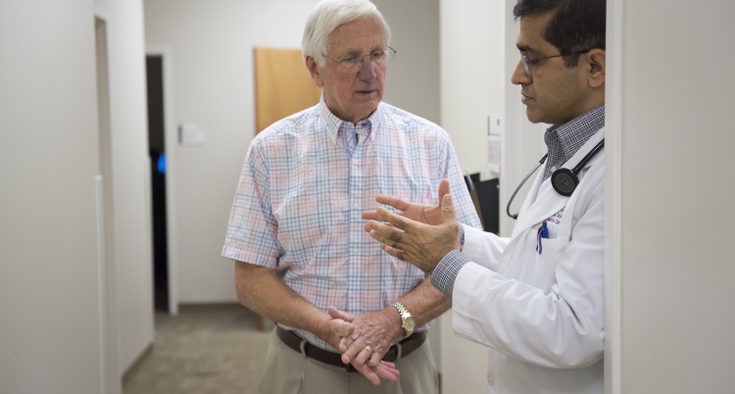
Patients referred to Novant Health Heart & Vascular Institute start their treatment journey with a key first step: forming a relationship with their care team.
“We make sure they are getting individualized care that is coming from the same individual physician or team that knows them and their situation — they are not part of an assembly line,” said James Roberts, MD, clinical physician executive for Novant Health Heart & Vascular Institute in the greater Charlotte area. “That is one of the most important parts of delivering remarkable care.”
Novant Health has five hospitals in the Charlotte market and seven Heart & Vascular Institute branches delivering outpatient services, with expansion underway. The cardiology service line spans preventive cardiology, vascular medicine, treatment of lipid disorders, structural heart care, cardiothoracic surgery, wound care and more.
Here are five ways Novant Health Heart & Vascular Institute is expanding remarkable care for patients.
1. Advancing diagnostic processes to provide minimally invasive care
Depending on the patient’s condition, Novant Health physicians implement both standard and advanced technology during the diagnostic process.
HeartFlow Fractional Flow Reserve CT Analysis, or the HeartFlow FFR CT Analysis, is now a mainstream tool at the institute and available in all of our hospitals. Using CT images, a company called HeartFlow uses AI to show the difference in pressure before a blockage and after a blockage. The scan allows us to determine if the patient potentially needs a stent or a bypass versus whether the patient can be managed with medications alone.
“The point of this noninvasive approach is to avoid invasive intervention when possible,” Roberts said. “For us, in our first year of using HeartFlow, the analytical tool identified close to 18% more people who needed intervention than before."
Technology has also improved electrophysiology approaches. “Our team that does ablations uses CT and MRI scans to identify sites of atrial fibrillation,” Roberts said. “Previously, patients with fibrillation commonly had to return for additional ablations due to limitations of technology. Now it’s a much more accurate procedure, with the majority of patients only going through ablation once.”
There are very specific subspecialties to deliver care plans that deal with problems quickly and more effectively, versus just general cardiology.”
2. Streamlining care to subspecialties to improve efficiency
“There are very specific subspecialities to deliver care plans that deal with problems quickly and more effectively, versus just general cardiology,” Roberts said. “Subspecialties range from our electrophysiology team to our structural heart team. Once we identify the problem, we will streamline care to get patients to the physician they need. Throughout this process, it’s important for us to be in contact with their referring physician to have them know what we’re doing with the patient and try to involve them as part of the team.”
3. Building comprehensive care plans to address long-term needs
“If the patient is not in a critical situation, we generally want to start with lifestyle changes and preventive measures,” Roberts said. “We want to identify opportunities for lifestyle management, including diet and exercise, so we put those patients in touch with our nutrition team and our exercise physiologists so we can begin a comprehensive program to reduce risk.
“For those who need medications, we prescribe medications. Because those can be expensive, we try to reduce costs for lower-income patients through a program with clinical pharmacists.”
Make a referral to one of our interventional cardiologists:
Charlotte: 704-343-9800
James Roberts, MD
Winston-Salem: 336-277-2000
Rafael Cavalcanti, MD
Coastal: 910-662-9500
William Lewis, MD
4. Applying minimally invasive surgical techniques to maximize positive outcomes
“We have a minimally invasive bypass program for select patients,” Roberts said. “Instead of a sternotomy, surgeons can go in between the ribs. We also have an advanced, minimally invasive mitral valve program, where surgeons can repair the mitral valve in a similar way, where they don’t have to crack the chest. We were the first institution in North Carolina to do a transcatheter mitral valve replacement.
“Our vascular surgeons also perform minimally invasive procedures for patients with vascular blockages or aneurysms, in the aorta or other large vessels that are repairable with stents.”
5. Expanding remote patient monitoring to reduce patient burden and improve health equity
“We’ve used remote monitoring in the cardiac rehab space and the congestive heart failure space, where we give patients an iPad to store bioscience data from home,” Roberts said. “Our care team can track and monitor them as if they were present. We are expanding that program to get to areas that are more challenging from an access and health equity point of view, from west Charlotte to Salisbury."
To partner with Novant Health Heart & Vascular Institute or refer a patient,
call 833-484-4811.






